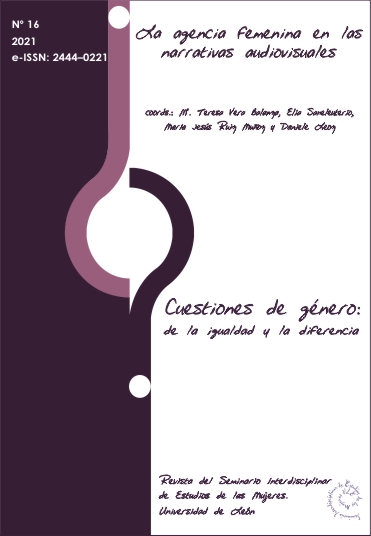Domestic Transgressions and Female Agency in Lucrecia Martel’s Las dependencias (1999)
DOI:
https://doi.org/10.18002/cg.v0i16.6955Keywords:
Lucrecia Martel, female domestic workers, dynamics of affect, class, gender, sexualityAbstract
This article studies the filmic representation of the female domestic worker in Las dependencias (Lucrecia Martel, 1999), a film about the Argentine writer Silvina Ocampo. This is a pioneer documentary in contemporary Latin American cinema based on the centrality given to the housekeeper as a complex and idiosyncratic character, a portrayal not found in 20th century Latin American cinema. Through the analysis of the female workers’ testimonies, domestic places and objects, and the intertextuality with Ocampo’s short story Las vestiduras peligrosas, we explore the representation of class differences, the power dynamics and the affective dimensions found in the servant-mistress relationship, and the strategies of resistance that make the domestic worker a subject with a voice and agency of her own.
Downloads
Métricas alternativas
References
Aguilar, Gonzalo (2008): New Argentine Film: Other Worlds. New York: Palgrave Macmillan.
Barthes, Roland (1981): Camera Lucida: Reflections on Photography. Trad. por Richard Howard. New York: Hill and Wang.
Butler Flora, Cornelia (1989): “Domestic Service in the Latin American Fotonovela”. En: Elsa Chaney, Mary García Castro y Margo L. Smith (eds.): Muchachas no more: Household workers in Latin America and the Caribbean. Philadelphia: Temple University Press: 143-159.
Butler, Judith (1990): Gender Trouble: Feminism and the Subversion of Identity. New York: Routlege.
Domínguez, Nora y Adriana Mancini (2009) (ed.): La ronda y el antifaz. Lecturas críticas sobre Silvina Ocampo. Buenos Aires: Universidad de Buenos Aires.
Gemünden, Gerd (2019): Lucrecia Martel. Urbana: University of Illinois Press.
Gorbán, Débora (2015): “Representaciones sociales en disputa: los procesos de selección de trabajadoras del cuidado entre familias de clase media en la ciudad de Buenos Aires”. En: Trabajo y sociedad, vol. 25. Disponible en: https://www.unse.edu.ar/trabajoysociedad [24/05/2021].
Kristeva, Julia (1980): Desire in Language: A Semiotic Approach to Language and Art. New York: Columbia University Press.
Koch, Gertrude (1985): “Ex-changing the Gaze: Re-visioning Feminist Film Theory”. En:¡New German Critique, vol. 34, pp. 139-153.
Lauretis de, Teresa (1987): Technologies of Gender: Essays in Theory, Film, and Fiction. Bloomington: Indiana University Press.
Martel, Lucrecia (1999): Las dependencias (1999): [Documental]. Dir. Lucrecia Martel, Prods. Lita Stantic, Ana de Skalon.
Martin, Deborah (2016): The Cinema of Lucrecia Martel. Manchester: Manchester University Press.
Mascioto, María de los Ángeles (2011): “‘Las vestiduras peligrosas’ (Silvina Ocampo, 1970): de la obra de arte a la reproducción”. En: abeache, vol. 1, nº. 1, pp.157-166.
Mengolini, Clara (2015): “Composición escénica y visual en los cuentos de Silvina Ocampo”. Tesis de doctorado, Graduate School of Vanderbilt University. Disponible en: https://ir.vanderbilt.edu/handle/1803/13988 [02/02/21].
Mengolini, Clara (2018): “La performance como herramienta de rebeldía social en los cuentos de Silvina Ocampo”. En: Chasqui, vol. 47, nº. 2, pp. 245-255.
Ocampo, Silvina (1970): “Las vestiduras peligrosas”. En: Los días de la noche, Madrid: Alianza.
Osborne, Elizabeth (2020): “Moving Beyond Maternalism: Negotiating Models of Womanhood in La nana, Cama adentro, and Hilda”. En: Elizabeth Osborne y Sofía Ruiz-Alfaro (coords.): Domestic Labor in Twenty-First Century Latin American Cinema. Palgrave Macmillan, pp. 53-74.
Page, Joanna (2009): Crisis and Capitalism in Contemporary Argentine Cinema. Durham: Duke University Press.
Kratje, Julia (2017): “Voces y cuerpos del servicio doméstico en el cine latinoamericano contemporáneo”. En: Imagofagia, vol. 15: pp.1-21. Disponible en: http://www.asaeca.org/imagofagia [15/02/21].
Kratje, Julia (2020): “Contagiosas, sinuosas, insinuantes: La naturaleza de las voces insumisas en Las dependencias de Lucrecia Martel”. En: Revista Digital DocuDAC, nº. 4. Disponible en: http://www.revistadocudac.com.ar [15/02/21].
Rangil, Viviana (2007): “En busca de la salvación: sexualidad y religión en las películas de Lucrecia Martel”. En: Viviana Rangil (ed.): El cine argentino hoy: entre el arte y la política. Buenos Aires: Editorial Biblos, pp. 209-220.
Selimovic, Inela (2018): Affective Moments in the Films of Martel, Carri and Puenzo. Londres: algrave Macmillan.
Shaw, Deborah (2016): “Intimacy and Distance: Domestic Servants in Latin American Women’s Cinema: La mujer sin cabeza and El niño pez”. En: Deborah Martin y Deborah Shaw (eds.): Latin American Women Filmmakers: Production, Politics, Poetics. Londres: I.B. Tauris, pp. 123-148.
Skeggs, Beverley (1997): Formations of Class and Gender: Becoming Respectable. Londres: Sage Publications.
Skvirsky, Salomé Aguilera (2020): “Must the Subaltern Speak? On Roma and the Cinema of Domestic Service”. En: FORMA, vol. 1, nº. 2, pp.1-34.
Zapata, Mónica (2005): “Breves historias de género: las feminidades tramposas de Silvina Ocampo”. En: Pandora: revue d'études hispaniques, vol. 5, pp. 251-262.
Downloads
Published
How to Cite
Issue
Section
License
Copyright (c) 2021 Sofía Ruiz Alfaro

This work is licensed under a Creative Commons Attribution-NonCommercial-ShareAlike 4.0 International License.
Los autores que publican en esta revista están de acuerdo con los siguientes términos:
- Los autores ceden de forma no exclusiva los derechos de explotación (reproducción, distribución, comunicación pública, transformación) a la Universidad de León, por lo que pueden establecer, por separado, acuerdos adicionales para la distribución no exclusiva de la versión de la obra publicada en la revista (por ejemplo, alojarlo en un repositorio institucional o publicarlo en un libro), con un reconocimiento de su publicación inicial en esta revista.
- Este trabajo se encuentra bajo la Creative Commons Attribution-NonCommercial-ShareAlike 4.0 International License. Puede consultarse desde aquí la versión informativa y el texto legal de la licencia.
- Se permite y se anima a los autores a difundir electrónicamente las versiones pre-print (versión antes de ser evaluada) y/o post-print (versión evaluada y aceptada para su publicación) de sus obras antes de su publicación, ya que favorece su circulación y difusión más temprana y con ello un posible aumento en su citación y alcance entre la comunidad académica.










